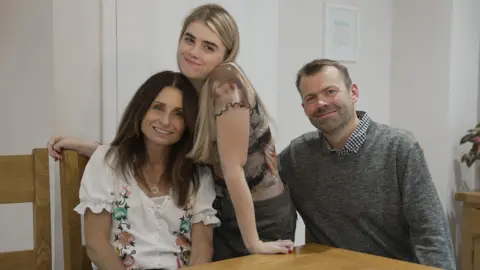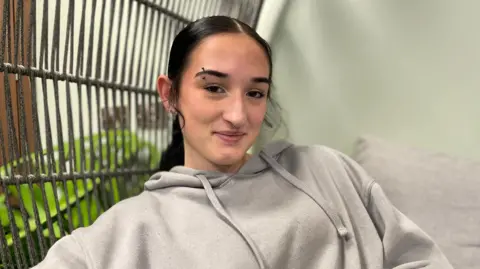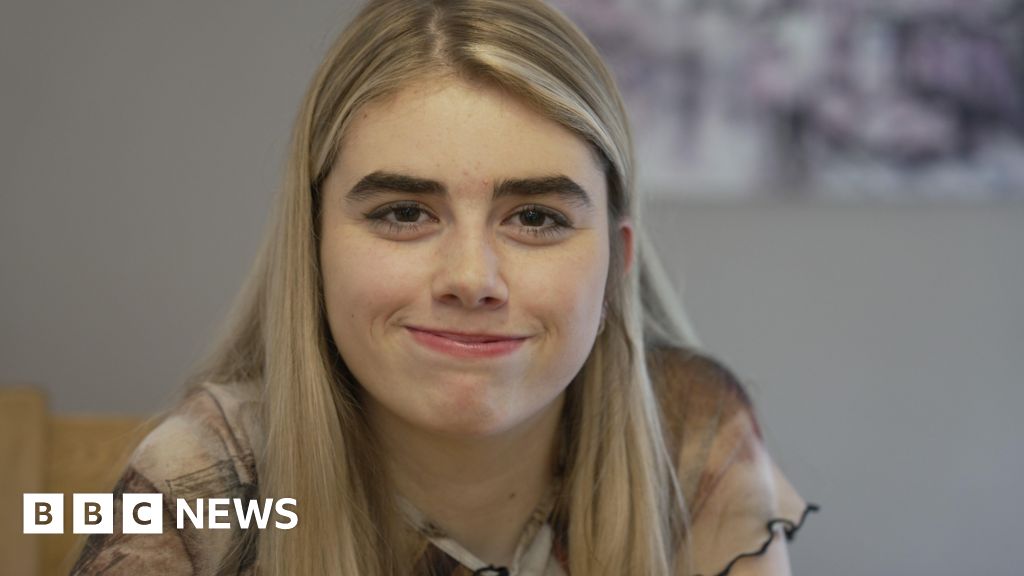 BBC
BBCA 15-year-old girl with a condition that makes it hard to talk says she wants to fulfil her dream of performing on stage.
Scarlett, from Flintshire, has selective mutism, a severe anxiety disorder that leaves people unable to speak in certain situations and left her off school for two years.
Along with Lucia, 17, from Swansea, she said a lack of awareness and understanding about the condition could make things worse.
About one in 140 young people are affected, according to NHS estimates.
The NHS says that a child or adult with selective mutism “does not refuse or choose not to speak at certain times, they’re literally unable to speak“.
“The expectation to talk to certain people triggers a freeze response with feelings of anxiety and panic, and talking is impossible.”
Scarlett describes herself as “really chatty” and someone who loves musical theatre, but she can feel overwhelmed with anxiety around other children in school.
“I’m just constantly thinking ‘what is that person thinking about me?’ And then you’re like ‘I’m just not going to say anything’,” she said.
“I think it’s your mind telling you ‘no, don’t say that’.”
At the age of 13, she stopped going to school and did not go back for almost two years.
“Not many people know about it, you can feel quite lonely and isolated most of the time,” she said.

Scarlett was diagnosed with selective mutism at the age of eight, although her parents, Steve and Emma, believe she started showing signs as young as five.
“It’s been a really long time of struggles and appointments, referrals and just not being settled really, and not being very happy in that time either,” said Emma.
The couple described visiting a wide range of professionals, from psychologists to hypnotherapists, with no results.
“I spoke to somebody once that they’ve been in the profession as a psychologist for 25 years, and they said I probably knew more than they did, so that was a bit of a worry,” Emma added.
What is selective mutism?
Selective mutism can start at any age but most often begins in early childhood between the ages of two and four.
The main sign is a marked contrast in the child’s ability to engage with different people, a sudden stillness or frozen facial expression when talking to someone outside their comfort zone.
Experts regard selective mutism as a fear or phobia of talking to certain people, the cause is not always clear, but is associated with anxiety.
A child can successfully overcome selective mutism if it is diagnosed at an early age and appropriately managed.
Scarlett’s dad Steve said it could be difficult to deal with the lack of understanding from others.
“She is very talkative, outgoing, very social, and she wants to do what every other boy and girl her age is doing: basically, going to the shops, going to the cinema.
“The selective mutism, over the years, has stopped that,” he added.

For Lucia from Swansea, selective mutism is also a barrier to her going to school, college or getting a job.
“It’s really hard, because it feels like everyone else is moving on with their lives, and I’m just stuck doing nothing,” she said.
The 17-year-old said she had whole conversations planned in her head, but her voice completely disappears.
“It is like I just stand with my mouth open, and all I really want to do is just cry, because I’d love to have normal conversations with people, but the words just will not come out,” she added.
She has tried numerous therapies but, with limited results, she is worried about her future.
“It’s been really hard – because people don’t know about it, they don’t know how to help,” she added.
Anita McKiernan, a specialised speech and language therapist, said there had been poor awareness and understanding of the condition for decades.
She said more research and more specialist therapists meant things had “significantly improved” over the past five years, albeit from a “low base”.
Ms McKiernan, an adviser to the Royal College of Speech and Language Therapists in selective mutism, added the condition, while thought of as rare, was relatively common, especially in pre-school children.
“The entire early years in school workforce also need to be trained in how to identify and effectively manage selective mutism because they’re on the front line of picking it up, and the delays tend to occur because staff may be thinking that the child will grow out if it,” she said.
The Welsh government said: “Practitioners need to be upskilled to support children and young people with speech, language and communication needs and our Talk with Me delivery plan aims to achieve this.
“We are also developing resources aimed at parents and teaching staff to provide universal and targeted support for children with selective mutism.”


